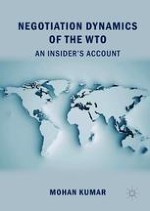
2018 | OriginalPaper | Chapter
1. The Mother of All Rounds
Activate our intelligent search to find suitable subject content or patents.
Select sections of text to find matching patents with Artificial Intelligence. powered by
Select sections of text to find additional relevant content using AI-assisted search. powered by
Abstract
-
negotiating outcomes being unfair and unbalanced;
-
use of brute force by powerful nations to achieve their negotiating goals at the expense of others;
-
lack of accommodation or sensitivity to others’ national interest or negotiating concerns;
-
use of disproportionate negotiating effort by developing countries with no corresponding results to show for in negotiations; and
-
there being a skewed outcome for some in terms of benefits and obligations in the negotiations.